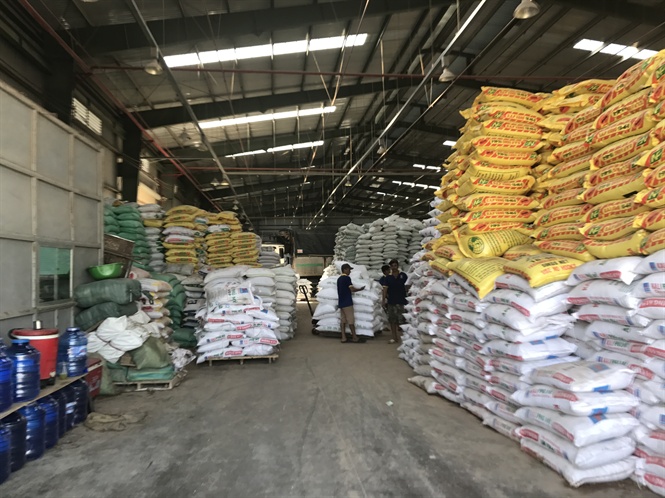- Giới thiệu
- Nhóm Công tác
- Tin tức
- Thông tin về FTA
- Tài Liệu
- Sự kiện
- Liên hệ
No regulation for temporarily removing safeguard measures on DAP fertiliser
According to the Trade Remedies Authority of Vietnam under the Ministry of Industry and Trade, as agricultural production plays a key role in Vietnam’s economy, it is necessary to avoid complete reliance on imported fertilisers

Some Vietnamese fertiliser importers have proposed Government on a temporary halt of safeguard measures on imported DAP and MAP fertilisers due to increased fertiliser prices all over the world and in Vietnam as well.
After reviewing and assessing the situation, the Trade Remedies Authority of Vietnam (TRAV) said that the safeguard measures on DAP and MAP were imposed after careful consideration and consultations. Moreover, under Vietnam’s legal framework, there is no regulation allowing a temporary suspension of safeguard measures.
On March 2, 2018, the Ministry of Industry and Trade officially apply safeguard measures on DAP and MAP fertilisers - complex inorganic fertilizers, with the main component of nitrogen and phosphorus, whose function of lining, dressing crops and production of NPK fertilizer.
The safeguard tax for the two fertilisers is over VND 1.1 million per tonnes.
On March 3, 2020, the ministry extended the safeguard measures on DAP and MAP fertilisers to September 6, 2022, with a yearly-reduced tax that would drop to VND 1 million per tonne.
According to TRAV, before 2009 when there were no DAP factories in Vietnam, DAP fertiliser used to reach VND 18,000 per kilo, which left negative impacts on domestic agriculture production.
Vietnam imposed safeguard measures on DAP and MAP fertilisers as seeing that many WTO members including the US, EU and Canada imposed safeguard measures to ensure healthy competitions in key manufacturing industries like fertiliser, metals, chemicals and plastic.
Vietnam’s safeguard measures on DAP and MAP are under the light of the Law on Foreign Trade Management and in line with the World Trade Organisation’s regulations.
The Ministry of Industry and Trade conducted a survey and took into account economic and social factors before deciding safeguard tax rates for imported DAP and MAP.
The rates are lower than those regulated by WTO. Vietnam’s safeguard measures are also applied for a shorter time than WTO regulations and would be reduced under a roadmap, which shows that the ministry’s careful reviewal regarding domestic fertiliser market and the impacts of safeguard measures on relevant parties as well as on rice production costs.
At the time when the safeguard measures were first imposed, the safeguard tax was about 0.66 per cent of the total rice production cost in Vietnam. The rate is lower now as the safeguard tax is gradually reduced while other costs in rice production have been increasing.
Responding to some fertiliser importers’ proposal on suspending the safeguard measures temporarily, the Trade Remedies Authority of Vietnam announced that the Ministry of Industry and Trade was co-operating with relevant ministries and agencies to observe the changes of DAP and MAP fertilisers prices, the prices of input materials, production and trade results of domestic enterprises.
Accordingly, DAP fertiliser's price increased in recent time was mostly due to factors like increased prices of input materials and increased transportation cost.
Domestic demand for DAP is not higher than that of the previous year. Moreover, besides imported DAP, prices of other imported fertilisers which are not subject to safeguard measures are also increased sharply.
The Trade Remedies Authority of Vietnam emphasised that trade remedies, including safeguard measures, are long-term measures to provide a fair competitive environment between domestic goods manufacturing and imported goods.
In particular, the application of safeguard measures has complied with relevant laws and regulations. Besides, the current laws have no provisions on the temporary cancellation of safeguard measures to adapt to temporal changes.
Therefore, the Ministry of Industry and Trade will continue to coordinate with the Ministry of Agriculture and Rural Development and relevant agencies to assess and review safeguard measures in an objective, comprehensive and consistent manner.
Tin liên quan
Plant health management helps increase coffee yield up to 15%2025/10/16
An Giang to host 2025 OCOP forum for sustainable development2025/09/25
Viet Nam and France foster cooperation on blue economy and sustainable environment2025/09/29
Agriculture and Environment exhibition ready for National celebration2025/08/27
Vietnam to transfer 1 million tons of carbon credit the World Bank2025/08/29



 Điều lệ hoạt động
Điều lệ hoạt động



















































